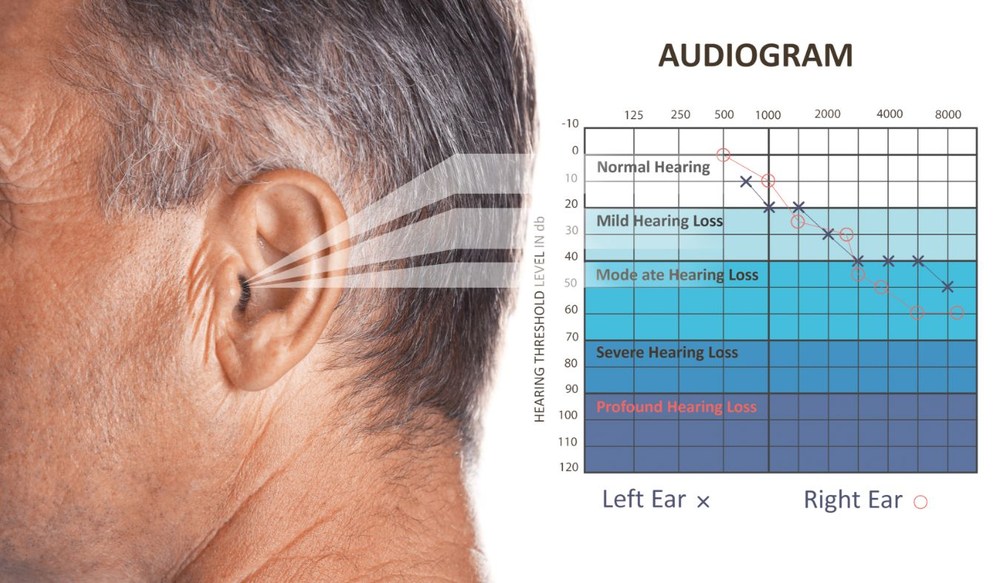Understanding Your Hearing Test Chart and Results
After you take a hearing test, your audiologist will show you a chart with
Evening & Saturday Appointments Available. LEARN MORE →

By: admin | March 26, 2024
The link between your hearing and heart health may not be the first thing you think of when it comes to overall wellness. But, recent studies suggest a possible connection between hearing loss and cardiovascular issues. This link is not as surprising as it first appears, considering both systems rely heavily on healthy blood flow. Knowing about this potential connection could be crucial in early detection and management of both conditions. While experts are still investigating this correlation, its implications for proactive health care are worth your attention. Our bodies work as interconnected systems, where changes in one area can affect others.
Hearing loss can be compared to a radio station. Just as you might struggle to tune into your favorite radio station when you’re out of range, hearing loss can make it difficult for you to pick up on certain sounds and frequencies.
Similarly, a weak signal can result in fuzzy or unclear sound from your radio, hearing loss can cause distorted or muffled sounds. You might find yourself frequently adjusting the volume, much like you would with a radio that isn’t quite picking up the signal properly.
Imagine if that radio station was permanently turned off – this is similar to profound hearing loss where the ability to hear certain sounds is entirely lost. It’s important to remember that while this analogy helps us understand the basics of hearing loss, each person’s experience is unique and can vary greatly.
Blood flow plays a crucial role in maintaining optimal hearing health. The delicate structures of the inner ear, including the cochlea and auditory nerve, rely on a steady supply of oxygen-rich blood to function properly. Adequate blood flow ensures that these structures receive the nutrients and oxygen they need to sustain healthy hair cells and nerve function.
When blood flow to the inner ear is compromised or reduced, it can lead to a range of hearing-related issues. Reduced blood flow may deprive the inner ear of oxygen, leading to damage or degeneration of the hair cells and auditory nerves. This damage can manifest as hearing loss, tinnitus (ringing in the ears) or other auditory disorders.
Various factors can impact blood flow to the inner ear, including cardiovascular conditions like hypertension, atherosclerosis or diabetes. Additionally, lifestyle factors like smoking, poor diet and lack of exercise can contribute to poor circulation, affecting blood flow to the inner ear.
Let’s move forward and explore the potential connection between hearing loss and heart health. They may seem unrelated, but research suggests a surprising link.
Studies have shown that issues with cardiovascular health can impact your hearing. This is because both your heart and ears rely on good blood flow to function properly. If your heart isn’t pumping blood effectively, it could lead to problems with your hearing. So, keeping your heart healthy could also help protect your hearing. Regular exercise and a balanced diet are key in maintaining both heart and ear health.
When we look at the science of this intriguing connection, it’s interesting to note that the inner ear is extremely sensitive to blood flow. Therefore, any condition that restricts or impedes healthy circulation, such as cardiovascular disease, could potentially impact your hearing. It’s comforting to know that by taking care of your heart health, you’re also safeguarding your hearing abilities.
Cardiovascular health and hearing are intricately linked, with cardiovascular issues often having a significant impact on hearing health. Conditions such as hypertension, atherosclerosis and diabetes can affect blood flow throughout the body, including to the delicate structures of the inner ear.
The inner ear, responsible for converting sound waves into electrical signals that the brain interprets as sound, relies on a steady supply of oxygen-rich blood to function optimally. When blood flow is compromised, the inner ear may not receive sufficient oxygen and nutrients, leading to damage or degeneration of the hair cells and auditory nerves.
Hypertension, or high blood pressure, can damage blood vessels throughout the body, including those supplying the inner ear. This can result in reduced blood flow to the inner ear, potentially leading to hearing loss or tinnitus (ringing in the ears). Similarly, atherosclerosis, characterized by the buildup of plaque in the arteries, can restrict blood flow and impact hearing health.
Individuals with diabetes are also at higher risk of hearing loss, as the condition can damage blood vessels and nerves, including those in the inner ear. Poorly managed diabetes can exacerbate hearing-related issues, highlighting the importance of proactive management of the condition.
It’s important to understand that changes in your hearing could potentially indicate early signs of heart problems. Research suggests that sudden or gradual hearing loss might be an early warning sign of cardiovascular issues. By monitoring changes in your hearing and discussing them with a hearing health professional, you could possibly detect heart problems earlier and take necessary preventive measures. This emphasizes the importance of regular hearing check-ups as part of your overall health care routine.
If you’re already dealing with hearing loss, this information might seem daunting. But don’t worry, there are ways to manage both your hearing and heart health effectively. One obstacle you might face is understanding the full impact of your hearing loss on your overall health, including potential cardiovascular risks. To address this, regular discussions with your audiologist can be incredibly beneficial. They can provide valuable insights and recommend strategies to help you maintain optimal heart and ear health.
Also, if you have existing hearing loss, the idea of additional health complications can be overwhelming. A proactive approach to your health can be a great solution to this challenge. Regular exercise and a balanced diet can go a long way in promoting healthy blood flow which benefits both your heart and ears. Taking care of one aspect of your health often has positive effects on others too.
Stressing the importance of proactive health care, regular hearing assessments can serve as a vital tool for early heart problem detection. These evaluations not only help monitor your hearing health but can also provide insights into potential cardiovascular issues.
Think of these assessments as routine check-ups for your car; they help detect small issues before they turn into significant problems. Similarly, regular hearing checks can identify changes in your hearing that could indicate underlying heart problems. So, make sure to schedule routine appointments with your audiologist – it’s a simple step that could have far-reaching benefits for both your ear and heart health.
Taking our discussion a step further, let’s consider the potential benefits of integrating cardiovascular care with routine hearing check-ups. By doing so, we could create a more comprehensive approach to health care that considers the interconnected nature of our bodies.
This combined approach is not just about convenience; it’s about recognizing that our bodies are interconnected systems where changes in one area can impact others. By merging cardiovascular care with routine hearing check-ups, we’re acknowledging this intricate relationship and using it to our advantage for better overall health management.
Taking care of your heart and ears might seem like two separate tasks, but as we’ve seen, they’re more connected than you might think. Therefore, adopting strategies that support both these areas can lead to improved overall hearing health.
Here are a few simple yet effective strategies:
If you’ve noticed changes in your hearing or if you’re concerned about how your heart health may be affecting your ability to hear, we encourage you to reach out to us at Audiology Partners. Our dedicated team of audiologists in Marlton, NJ is ready to assist with comprehensive evaluations and personalized solutions. Contact us today at (856) 712-1933.

After you take a hearing test, your audiologist will show you a chart with
By: admin | January 19, 2026

Choosing a hearing aid isn’t about finding the single
By: admin | November 18, 2025

Hot weather activities shouldn’t require you to worry constantly
By: admin | September 24, 2025
